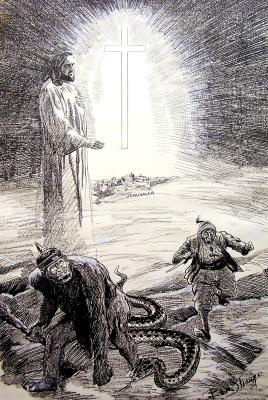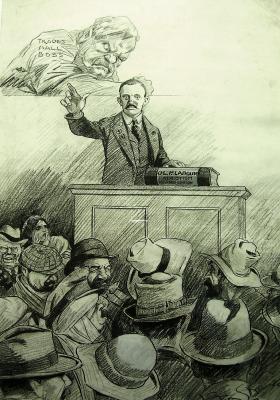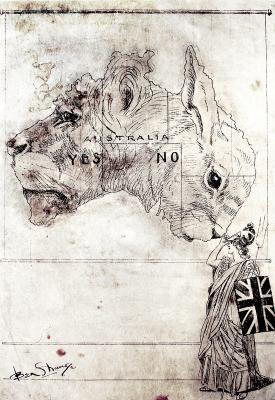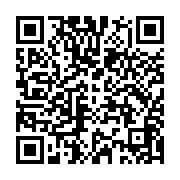CARTOON - THE LAW OF THE SUSPECT CALUMNY
1918This black and white hand drawn cartoon features four women standing near a lamp post. Behind them are three men. The middle man is in a dark uniform. The man on the right is leaning over to talk to him with a hand raised to partially cover what he is saying. A snake with text reading [CALUMNY] written on its body is slithering around the man on the right’s legs
Ben Strange’s signature is in the bottom right corner.
When published the cartoon was published in the Western Mail on 14 April 1918, page 7 it was accompanied with the following caption:
THE LAW OF THE SUSPECT
In several cases which came under my notice, Men had accused innocent girls and it had been established on enquiry that the girls know nothing about the men in question.'
Note: Calumny means - the making of false and defamatory statements about someone in order to damage their reputation; slander.
Ben Strange was a prominent political cartoonist in Western Australia who worked for the Western Mail from 1898 to 1930. This original hand drawn cartoon, by Ben Strange, was first published in the Western Mail on 19 April 1918.
Along with Strange’s cartoon of the 22 March 1918, this cartoon responds to public concern over mooted changes to the 1911 Health Act, which had previously been amended in 1915 to deal with the increasing number of VD cases during WW1.
As with the 22 March cartoon, this cartoon emphasises how opposition to the amendment focussed on the potential for innocent young men and women to be anonymously accused of having, and passing on, venereal diseases. On the 12 April 1918, The West Australian reported that it had interviewed the Victorian ex-Minister for Health, Mr McLeod, regarding similar health measures introduced in Victoria in December 1916. Mr McLeod reiterates the dangers of permitting anonymous accusations, pointing out that in Victoria a number of false statements were made for malicious purposes: ‘The fact that innocent men did accuse innocent girls of having given them the disease has been established beyond a doubt during the administration of the Victorian Act.’ (The West Australian, 12 April 1918). The newspaper report goes onto comment that the 1918 Bill guarantees immunity to the accuser, unlike a similar act passed in New Zealand in 1917 that made it an offence to accuse a person of venereal disease without any justification.
That the young woman of the cartoon is a shop girl is reinforced by a comment made by Dr William Trethowan (surgeon and founder of the Royal Australasian College of Surgeons) to the Select Committee on the Health Bill . He claimed that it was amateur prostitutes such as shop girls who posed the greatest danger in spreading venereal disease: ‘The professional prostitute has a reputation to conserve a reputation for cleanliness and freedom from disease. The amateur prostitute, the street loiterer, the shop girl from 15 to 18, have not that feeling in mind at all. They are often ignorant of the consequences of what they do, but they contract the disease and spread it in a way we cannot get at unless compulsion is provided.’ (The West Australian on Monday 11 March 1918, p.8). The Secretary of the Shop Assistants Union protested that Trethowan had no evidence to support such an accusation and that with the proposed changes to the Health Act, shop girls were now vulnerable to false accusation. Trethowan’s comments, it was argued, worked to create a ‘suspect’ class.
It is possible that the title of the cartoon, ‘The Law of the Suspect’, makes reference to a decree known as ‘The Law of Suspects’ introduced in Revolutionary France during the period from September 1793 to July 1794 (the reign of terror), when anyone suspected of not supporting the Revolution could be arrested and possibly executed. This decree represented a weakening of individual freedoms as the accused had to prove their innocence. In the same way, those anonymously accused in the 1918 amendment to the Health Act would have to prove they were free of venereal disease. A newspaper report into the 1918 Health Bill is titled ‘Law of the Suspect’, suggesting this phrase had some resonance within the WA community ( The West Australian on Monday 11 March 1918).
It is worth noting that the Bill to amend the Health Act of 1911 became law on the 13 June 1918. While the amendment to the Act allowed the Commissioner of Health to act on suspicion that an individual had a venereal disease, there was also a penalty for giving false information to the Commissioner; a fine of 50 pounds or imprisonment for12 months, with or without hard labour.
Details
Details
HIGH
The Ben Strange cartoons are historically significant as they depict many key figures linked to the history and development of both Western Australia and Australia. Political figures who regularly appeared in his cartoon’s included John ‘Happy Jack’ Scaddan, the Premier of Western Australia from 1911 until 1916, and William ‘Billy’ Hughes, the Prime Minister of Australia from 1915 to 1923.
City of Armadale - History House
City of Armadale - History House
Other items by Ben Strange
- CARTOON - THE TRIUMPH OF THE CROSS
- CARTOON - TRANSFUSION OF BLOOD
- CARTOON - REPAIRING HOUSE
- CARTOON - TOMMY WALKER- STILL GOING STRONG
- CARTOON - THE PREMIERS CONFERENCE BOVRILISED: BUT THE STATES LIVES IN HOPE
- CARTOON - LABOUR REFORM
- CARTOON - TWO OF A KIND
- CARTOON - WHEN CONSTABULARY DUTYS TO BE DONE - A POLICEMANS LOT IS NOT A HAPPY ONE
- CARTOON - THE WATCH DOG
- CARTOON - EXCUSE ME I HAVE A DEPUTATION TO MEET
- CARTOON - THE SAME OLD COW ON THE LINE
- CARTOON - EAST IS EAST AND WEST IS WEST
Other items from City of Armadale - History House
- CARTOON - THE WAITS CHRISTMAS 1916
- CARTOON - HIS TROUBLE
- CARTOON - SLUMDOM
- CARTOON - TEMPTING GOOD - A BERLIN SHOWCASE
- CARTOON - A DANGEROUS OCCUPATION
- CARTOON - STARVATION IN EUROPE
- CARTOON - SILENCE IS NOT ALWAYS GOLDEN - AND THE LAW MAKES A POOR CUPID
- CARTOON - A LITTLE BABY WITH A BIG BOTTLE
- CARTOON - THAT MALIGNANT GROWTH
- CARTOON - THE SIMPLE LIFE
- CARTOON - SIR WALTERS NEW MASH
- CARTOON - SANTA CLAUSE AND THE SILVER LINK



